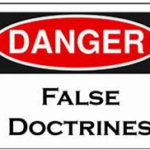 Following Elders into Error
Following Elders into Error
Mike Johnson
 Elders have a vital function in the Lord’s church. They are to oversee the flock— they are to feed, or shepherd, the local congregation of which they are a part (Acts 20:17, 28; I Pet. 5:1-2). Elders are to watch for grievous wolves (or false teachers) who threaten the flock (Acts 20:29-30), exhort and convict those who contradict sound doctrine (Tit.1:9-11), admonish the members (I Th. 5:12), and be good examples to the flock (I Pet. 5:3).
Elders have a vital function in the Lord’s church. They are to oversee the flock— they are to feed, or shepherd, the local congregation of which they are a part (Acts 20:17, 28; I Pet. 5:1-2). Elders are to watch for grievous wolves (or false teachers) who threaten the flock (Acts 20:29-30), exhort and convict those who contradict sound doctrine (Tit.1:9-11), admonish the members (I Th. 5:12), and be good examples to the flock (I Pet. 5:3).
Another significant passage is Hebrews 13:17. In speaking of elders, it says, “Obey those who rule over you, and be submissive, for they watch out for your souls, as those who must give account. Let them do so with joy and not with grief, for that would be unprofitable for you.” Members are to be subject to the authority of the elders who oversee the flock, and most Christians recognize this principle. However, there are times when elders may lead a church into error by having it involved in various activities that are without Bible authority. What should be the attitude of the members at this point?
Frequently, errors will creep into a congregation. Some Christians will defend their involvement with that congregation based on the authority of the elders. They might contend, “These men are our elders, and we are to be subject to them.” The idea seems to be that the individual member is relieved of the responsibility of fellowshipping and rebuking error (Eph. 5:11, 2 Jn. 9). They feel like this because the elders, whom they are to be subject to, have decided that a particular practice is Scriptural. This thinking is erroneous. Let us apply the reasoning to some other realms of authority to which we are to be subject.
(1) Government/Citizen– The Bible teaches us to be subject to civil authority (Rom. 13:1-7). However, should we obey the government if it tells us to do that contrary to God’s Word? This situation occurred in Acts 5 when the Jewish authorities imprisoned the apostles for teaching God’s Word. After an angel released them, they returned to the temple to continue teaching. When brought before the council, the high priest (28) asked them, “Did we not strictly command you not to teach in this name? And look, you have filled Jerusalem with your doctrine, and intend to bring this Man’s blood on us!” Peter then responded, “We ought to obey God rather than men” (vs. 29). Thus, when God’s law comes in conflict with the ordinances of men, obedience to God is still essential! The authority of the civil government does not give us an excuse to disobey God.
(2) Husband/wife– The Bible also teaches the husband is to be the head of the wife, and the wife is to be subject to her husband (Eph. 5:23-25). However, if a husband were to tell his wife not to attend church services, for example, she should not do what he says. In that situation, she would have to obey God rather than man. The wife would be unable to excuse herself before God for missing services based on being subject to her husband.
(3) Parent/child– Another principle taught in the Scriptures is that children are to be subject to their parents (Eph. 6:1). Again, they are to obey their parents “in the Lord” (vs. 1). A child whose father tells him to lie, for example, could not do so as he is asking the child to violate God’s Word.
The lesson from the above examples is quite clear. Being subject to human authority does not justify our participation in error. Citizens are to be subject to the government, wives are to be subject to their husbands, and children are to be subject to their parents. However, when any of the above authorities ask us to violate God’s will, we must disobey them and are responsible when we do not.
Similarly, we cannot justify our involvement with a congregation that practices error based on subjection to the elders. Elders leading a group into error do not serve as a “buffer” between the members and God, as members are still responsible for their involvement with that error. What if the elders of a congregation, for example, decided to put instrumental music into the worship? Could a person justify his involvement with this innovation by saying it was the elder’s decision, and we are to be subject to the elders? Would the person be any less responsible?
We must remember Ephesians 5:11. This passage says, “And have no fellowship with the unfruitful works of darkness, but rather expose them.” 2 John 9 points out how we must “abide in the doctrine of Christ.” Further, Paul warned the Ephesians elders that after his departure, “savage wolves will come in among you, not sparing the flock. Also from among yourselves men will rise up, speaking perverse things, to draw away the disciples after themselves.” (Acts 20:29-30).
As Christians, we must not tolerate error—we cannot fellowship it. On Judgment Day, excuses we make for our involvement with error, such as blaming the elders, will not do us any good. (Related Article)
__________
Was the Death of Stephen Unnecessary?
Wendell Wiser
 The title that heads this article may sound strange, but the actions and philosophies of some merit our consideration of such a question. It is true that we live in a country where we enjoy religious freedom. It is not against the law to preach Christ in our country, whereas it was against the law of the Jews for Stephen to preach Christ. There is a vast difference between the attitude of the officials in government in Stephen’s day and the attitude of the officials in government in our day. Sometimes, I wonder if there isn’t just as much a difference in the attitude of Stephen and the attitude of most preachers today. I don’t mean denominational preachers but those who claim to be gospel preachers.
The title that heads this article may sound strange, but the actions and philosophies of some merit our consideration of such a question. It is true that we live in a country where we enjoy religious freedom. It is not against the law to preach Christ in our country, whereas it was against the law of the Jews for Stephen to preach Christ. There is a vast difference between the attitude of the officials in government in Stephen’s day and the attitude of the officials in government in our day. Sometimes, I wonder if there isn’t just as much a difference in the attitude of Stephen and the attitude of most preachers today. I don’t mean denominational preachers but those who claim to be gospel preachers.
How many “gospel preachers” do you know that would use the plain language that Stephen used in his preaching? Stephen said, “Ye stiffnecked and uncircumcised in heart and ears, ye do always resist the Holy Ghost; as your fathers did so do ye. Which of the prophets have not your fathers persecuted? and they have slain them which shewed before of the coming of the Just One; of whom ye have been now the betrayers and murderers: Who have received the law by the disposition of angels, and have not kept it.” (Acts 7:51-53). Every person who claims to be a gospel preacher needs to examine those words very carefully. We need to ask ourselves the question: Would we preach like Stephen did? Would we say what he said, or would we water it down and soften it up? Would we reason that it would not be using good judgment to preach the way Stephen preached? If Stephen had used some of this good judgment that we are inclined to think about, he might not have been stoned to death.
Couldn’t Stephen have used a little more of what we call diplomacy and possibly saved himself from being stoned to death? Sometimes I wonder if what we are doing, when we talk about good judgment and diplomacy, is excusing ourselves for compromising the truth. Don’t misunderstand me. I am not recommending that we do not use good judgment.
Could you imagine Stephen or Paul or Jesus Christ keeping quiet when matters of truth are at stake? Would they excuse themselves from speaking out against unscriptural practices under the pretense of using good judgment or diplomacy? Preachers who never say anything against church support of human institutions, church-sponsored recreation, church-sponsored ball teams, and kindergartens should certainly ask themselves these questions. Also, preachers who are afraid to say anything about worldly practices, immodest apparel, etc. (Related Article)
from The Sunny Hill Bulletin, May 25, 1972
__________
What Might Have Been
Barney L. Keith
 How painful is the thought expressed by one of the great poets, John Greenleaf Whittier: “For of all sad words of tongue or pen, The saddest are these: ‘It might have been!”’
How painful is the thought expressed by one of the great poets, John Greenleaf Whittier: “For of all sad words of tongue or pen, The saddest are these: ‘It might have been!”’
Many a person has thrown away his life in drug addiction (including alcohol). Numerous are those who have thrown away their marriages by becoming involved with others. Parents have often lost their children by neglecting them or even granting them excessive freedom. Many are those who have thrown away a good name by some ungodly behavior. Do you not suppose that a vast majority of these later in life have shed tears of bitter remorse as they have thought of “what might have been”? It is too late, however, for all has been lost.
This bitter lament is found also in the Bible. It was expressed by the “weeping prophet,” Jeremiah (8:20), as he sadly exclaimed, “The harvest is past, The summer is ended, And we are not saved!” God had given His people ample time to repent and turn from their idolatrous, immoral ways. They had not shown any inclination to respond appropriately to His offers of mercy. When God was no longer willing to tolerate their wickedness, the Babylonian captivity became His means of teaching them a 70-year lesson. No doubt there were times in Babylon when they mourned and wept over “what might have been” if they had only listened to the voices of the prophets who had warned them.
Such lessons ought not to fall on deaf ears today. That individual who has stopped serving the Lord faithfully will one day realize what he has given up. It may be too late then to do anything about it. My dear wayward brother or sister, before the “harvest is past” and the “summer is ended,” you ought to take advantage of a merciful God’s offer of pardon by repentance, confession, and prayer. Better that, by far, than to stand condemned in the judgment and have to think of “what might have been.” That individual, too, who has never obeyed the gospel should ponder seriously what hell is like (according to God’s word) and submit himself to the rule of Christ in faith, repentance, confession, and baptism before it is too late to do so. Far better this than to be separated eternally from God and think of “what might have been. (Related Article)
__________
Is It Right to Criticize Another
Person’s Religion?
Kevin Kay
 It’s not only right to criticize false religion, no matter whose religion it is; it’s the faithful Christian’s responsibility. Jesus criticized the Pharisees for “teaching as doctrines the commandments of men” (Matthew 15:7-9). Paul criticized those who tried to bind the shadows of the Mosaic law on New Testament Christians (Colossians 2:16-23). Peter warned that false teachers would “secretly bring in destructive heresies” (II Peter 2:1-3). Elders and preachers are to rebuke sin and false doctrine (II Timothy 4:1-5; Titus 1:10-14). Christians are to “contend earnestly for the faith” (Jude 3), while having no fellowship with sin and error (II Corinthians 6:14-18).
It’s not only right to criticize false religion, no matter whose religion it is; it’s the faithful Christian’s responsibility. Jesus criticized the Pharisees for “teaching as doctrines the commandments of men” (Matthew 15:7-9). Paul criticized those who tried to bind the shadows of the Mosaic law on New Testament Christians (Colossians 2:16-23). Peter warned that false teachers would “secretly bring in destructive heresies” (II Peter 2:1-3). Elders and preachers are to rebuke sin and false doctrine (II Timothy 4:1-5; Titus 1:10-14). Christians are to “contend earnestly for the faith” (Jude 3), while having no fellowship with sin and error (II Corinthians 6:14-18).
Today many people have the mistaken idea that if someone believes in God and worships Him sincerely from the heart, it’s unkind, unloving, and unchristian to criticize his religious practices. But false doctrine (Ephesians 4:14), ignorant worship (Acts 17:23), and vain religion (James 1:27) do exist, and all the sincerity, zeal, sacrifice, and devotion in the world will not make wrong things right (Acts 26:9-11). Many sincere, zealous, religious people are going to be very surprised on Judgment Day when they are rejected by the Lord (Matthew 7:21-23).
Actually, the sincere religious person who is unknowingly following the commandments of men is in greater spiritual danger than the irreligious reprobate in the gutter, because at least the reprobate knows that he’s lost. To save those who are in religious error, someone must speak the truth. Obviously, he must speak the truth in love (Ephesians 4:15), but speak the truth he must. (Related Article)
__________
Voices from the Past
 A man was walking down a little hill in the woods when he stepped on a little twig. The twig rolled, and he fell down. As he got up and went on his way, he thought to himself, “If that had been a big log, I would have seen it and climbed over it. There would have been no danger of falling, for I would have been aware of the danger.” The fact that the twig was small was what made it dangerous.
A man was walking down a little hill in the woods when he stepped on a little twig. The twig rolled, and he fell down. As he got up and went on his way, he thought to himself, “If that had been a big log, I would have seen it and climbed over it. There would have been no danger of falling, for I would have been aware of the danger.” The fact that the twig was small was what made it dangerous.
In our spiritual pathway, the devil places little temptations to defeat us. His little traps or obstructions are more effective than the big ones, partly because if people do notice them, they may think they are too small to make a difference.
Beware of little things!! It was only a “little thing” — a bit of forbidden fruit — that brought sin and its curse into the world. (Related Article)
-Author Unknown
_____________________________________________
Short Audio Bible Messages
Understanding Angels
Mike Johnson
====================================================
Editor: Mike Johnson

